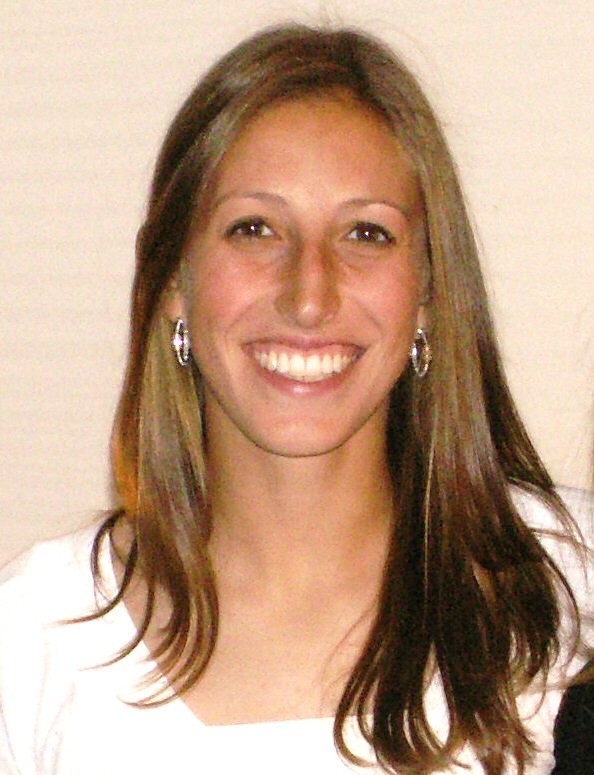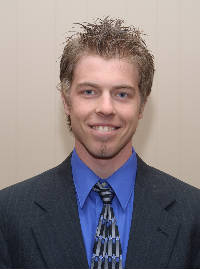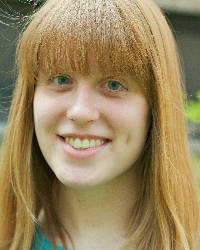The National Science Foundation awarded Graduate Research Fellowships to eight ME graduate students in the 2010 competition. The ME department congratulates Joshua Bishop-Moser, Jeremy Brown, Jessica Deneweth, Teresa Franklin, Jeremy Koehler, Ben Lawler, Ryan McGinnis, and Megan Roberts for this outstanding achievement.
 Joshua Bishop-Moser is researching “Design Synthesis Methodology for Elasto-Fluidic Systems,” in which he proposes a fundamentally different design approach for robots and mechanical devices. This approach, called elasto-fluidic systems, overcomes traditional limitations such as excessive weight, high cost, limited reliability and poor energy efficiency by being lightweight and energy efficient, while providing enhanced functionality with greater simplicity. “I became interested in this topic when learning about biological structures,” said Bishop-Moser. “Elasto-fluidic systems are ubiquitous in nature, existing in organisms ranging from worms to octopi to trees. This new design paradigm of elasto-fluidic systems will open a wealth of new opportunities for next generation robots, machines, medical devices, and consumer products.” His advisor for this project is ME Professor Sridhar Kota. After graduating in 2013, Bishop-Moser would like to continue research and development in mechanical design via a self-owned business.
Joshua Bishop-Moser is researching “Design Synthesis Methodology for Elasto-Fluidic Systems,” in which he proposes a fundamentally different design approach for robots and mechanical devices. This approach, called elasto-fluidic systems, overcomes traditional limitations such as excessive weight, high cost, limited reliability and poor energy efficiency by being lightweight and energy efficient, while providing enhanced functionality with greater simplicity. “I became interested in this topic when learning about biological structures,” said Bishop-Moser. “Elasto-fluidic systems are ubiquitous in nature, existing in organisms ranging from worms to octopi to trees. This new design paradigm of elasto-fluidic systems will open a wealth of new opportunities for next generation robots, machines, medical devices, and consumer products.” His advisor for this project is ME Professor Sridhar Kota. After graduating in 2013, Bishop-Moser would like to continue research and development in mechanical design via a self-owned business.
Through his research on “Sensory Haptic Feedback for Neuro-prosthetic Devices, Jeremy Brown seeks to develop novel forms of sensory feedback that enhance the interface between living and engineered systems for neuro-prosthetic applications. “[Prosthetic] devices that fail to provide sensory feedback to inform users about the position and movement of the artificial limb…do not support easy learning for incorporating the new degrees of freedom into motor control schemes,” said Brown. He and his advisor for the project, ME Professor Brent Gillespie, have developed a prosthetic device for upper-arm amputees and whole-bodied individuals that provides force feedback. Brown plans to finish his Ph.D. in 2013. After graduation, he will pursue a postdoctoral position at another university or national lab, and eventually hopes to return to academia as a professor.
 Jessica Deneweth is pursuing a combined PhD in Kinesiology and Mechanical Engineering. Her research interest is in the role of biomechanics in the development of post-traumatic knee osteoarthritis (OA). This research focuses on understanding the role of joint mechanics on the development of knee OA following anterior cruciate ligament (ACL) injury. Her objective is to determine the extent to which two knee joint factors—length of the ACL graft and posterior tibial slope angle—promote abnormal knee loading patterns that may induce OA. Professor Scott G. McLean serves as her advisor in the School of Kinesiology and ME Professor Ellen Arruda as her advisor in the ME department. Following graduation in 2013, Deneweth plans to obtain a postdoctoral position in an orthopedic biomechanics laboratory affiliated with a clinical research hospital or private research institution.
Jessica Deneweth is pursuing a combined PhD in Kinesiology and Mechanical Engineering. Her research interest is in the role of biomechanics in the development of post-traumatic knee osteoarthritis (OA). This research focuses on understanding the role of joint mechanics on the development of knee OA following anterior cruciate ligament (ACL) injury. Her objective is to determine the extent to which two knee joint factors—length of the ACL graft and posterior tibial slope angle—promote abnormal knee loading patterns that may induce OA. Professor Scott G. McLean serves as her advisor in the School of Kinesiology and ME Professor Ellen Arruda as her advisor in the ME department. Following graduation in 2013, Deneweth plans to obtain a postdoctoral position in an orthopedic biomechanics laboratory affiliated with a clinical research hospital or private research institution.
Teresa Franklin‘s research focuses on Ultrasonic Welding, a form of welding that uses vibrations and pressure to join materials without melting them. She intends to join magnesium and mild steel sheet using this process, offering the opportunity to explore and predict the strength of these welds, both experimentally and computationally. In addition, her research will investigate some of the roadblocks which currently prevent utilizing this technology in manufacturing joining processes. Franklin’s advisor is ME Professor Jwo Pan. She expects to graduate in 2012 and hopes to find a position in industry researching manufacturing processes and improvements.
 Jeremy Koehler‘s research interest is in hydraulic regeneration systems for hybrid vehicles. Hydraulic hybrids use hydraulic pump-motors instead of electric machines, as well as a high-pressure accumulator for energy storage, which gives the advantage of higher efficiency and improved fuel economy. The power-split hybrid architecture comprising of a planetary gear set and two hydraulic motors has a fundamental benefit of integrating both a parallel path and a serial power path. This design could, therefore, combine the benefits of both, if a proper control strategy is designed and deployed. Koehler’s aim will be to develop a high-fidelity simulation of the Power-split Hydraulic Hybrid System and study driver-vehicle interactions and adaptive control algorithms to optimize the performance and operation of the vehicle. ME Research Professor Zoran Filipi serves as his advisor. Koehler hopes to graduate in 2014, and plans to get a job doing design work in industry, possibly designing hybrid vehicle systems.
Jeremy Koehler‘s research interest is in hydraulic regeneration systems for hybrid vehicles. Hydraulic hybrids use hydraulic pump-motors instead of electric machines, as well as a high-pressure accumulator for energy storage, which gives the advantage of higher efficiency and improved fuel economy. The power-split hybrid architecture comprising of a planetary gear set and two hydraulic motors has a fundamental benefit of integrating both a parallel path and a serial power path. This design could, therefore, combine the benefits of both, if a proper control strategy is designed and deployed. Koehler’s aim will be to develop a high-fidelity simulation of the Power-split Hydraulic Hybrid System and study driver-vehicle interactions and adaptive control algorithms to optimize the performance and operation of the vehicle. ME Research Professor Zoran Filipi serves as his advisor. Koehler hopes to graduate in 2014, and plans to get a job doing design work in industry, possibly designing hybrid vehicle systems.
 Ben Lawler‘s research focuses on the “Effects of Combustion Chamber Deposits (CCDs) and Ceramic Coatings on Homogeneous Charge Compression Ignition (HCCI) Combustion.” The gasoline HCCI holds a promise of achieving very high efficiency with near-zero emissions of NOx and soot, but the success of practical applications will largely depend on the ability to expand the range of HCCI operation. The objective of Lawler’s research is to determine the mechanisms by which CCDs affect HCCI combustion by accurately characterizing the thermophysical properties of the deposit layer. This knowledge will guide solutions for achieving robust HCCI combustion and realizing the full potential for vehicle fuel economy improvements. His advisors for the project are ME Professor Dennis Assanis and Research Professor Zoran Filipi. Lawler hopes to graduate in 2013, and is considering staying in academia as a professor.
Ben Lawler‘s research focuses on the “Effects of Combustion Chamber Deposits (CCDs) and Ceramic Coatings on Homogeneous Charge Compression Ignition (HCCI) Combustion.” The gasoline HCCI holds a promise of achieving very high efficiency with near-zero emissions of NOx and soot, but the success of practical applications will largely depend on the ability to expand the range of HCCI operation. The objective of Lawler’s research is to determine the mechanisms by which CCDs affect HCCI combustion by accurately characterizing the thermophysical properties of the deposit layer. This knowledge will guide solutions for achieving robust HCCI combustion and realizing the full potential for vehicle fuel economy improvements. His advisors for the project are ME Professor Dennis Assanis and Research Professor Zoran Filipi. Lawler hopes to graduate in 2013, and is considering staying in academia as a professor.
 The topic of Ryan McGinnis‘s research is the use of wireless inertial measurement units for inverse dynamics analyses of human movement. He aims to develop a highly miniaturized, highly portable, wireless IMU technology to conduct this kind of analysis. “If successful,” he said, “my research will transform how researchers and practitioners deduce joint kinetics and therefore impact an enormous range of biomechanical applications including injury diagnoses and prevention, rehabilitation, and prosthetic evaluation amongst other uses.” ME Professor Noel Perkins is his advisor for the project. McGinnis hopes to graduate around May 2014, after which he plans on teaching.
The topic of Ryan McGinnis‘s research is the use of wireless inertial measurement units for inverse dynamics analyses of human movement. He aims to develop a highly miniaturized, highly portable, wireless IMU technology to conduct this kind of analysis. “If successful,” he said, “my research will transform how researchers and practitioners deduce joint kinetics and therefore impact an enormous range of biomechanical applications including injury diagnoses and prevention, rehabilitation, and prosthetic evaluation amongst other uses.” ME Professor Noel Perkins is his advisor for the project. McGinnis hopes to graduate around May 2014, after which he plans on teaching.
 Megan Roberts is researching “Carbon Nanotube Microstructures for Sensitive and Long Term Neural Recording and Stimulation.” Her goal is to develop novel materials for long term stimulation and recording of low amplitude signals in the central nervous system. Miniaturizing medical electrodes would reduce physical trauma associated with implantation and potentially lead to stimulation of a single neuron, allowing new understanding and treatment of neurodegenerative diseases. ME Assistant Professor A. John Hart serves as her advisor for the project. Roberts plans to graduate in 2014. As for her future plans, she said, “After grad school I want to invent, explore, travel the world, have a family, and stay healthy. I’m not sure yet whether that will be in academia or industry.”
Megan Roberts is researching “Carbon Nanotube Microstructures for Sensitive and Long Term Neural Recording and Stimulation.” Her goal is to develop novel materials for long term stimulation and recording of low amplitude signals in the central nervous system. Miniaturizing medical electrodes would reduce physical trauma associated with implantation and potentially lead to stimulation of a single neuron, allowing new understanding and treatment of neurodegenerative diseases. ME Assistant Professor A. John Hart serves as her advisor for the project. Roberts plans to graduate in 2014. As for her future plans, she said, “After grad school I want to invent, explore, travel the world, have a family, and stay healthy. I’m not sure yet whether that will be in academia or industry.”